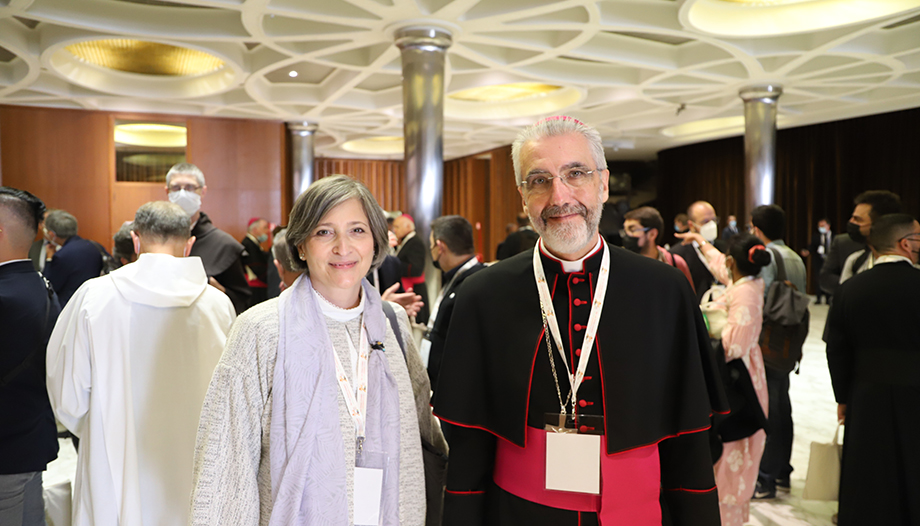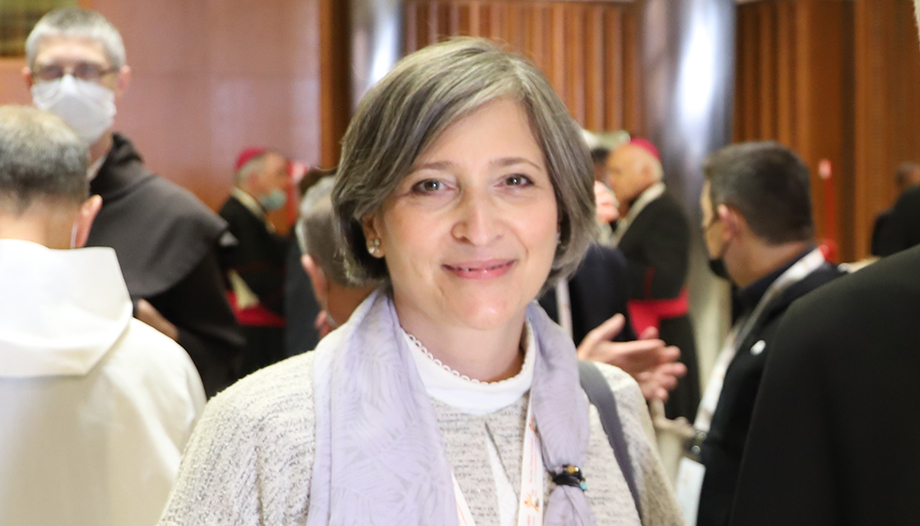




















When he received the mail from the General Secretariat of the Synod of Bishops inviting her to be one of the voices participating in the opening of the synod "For a synodal Church, communion, participation and mission", this laywoman, a theologian from the Faculty of Protestant Theology of Madrid and member of the Methodological Commission of the XVI Ordinary General Assembly of the Synod of Bishops, thought "they had made a mistake with Cristina".
Already at the opening ceremony, in his meditation, together with Pope Francis, he pointed out that it is "good and healthy to correct mistakes, to ask forgiveness for the crimes committed, and to learn to be humble. We will certainly experience moments of pain, but pain is part of love. And the Church hurts us because we love her. He spoke to Omnes about this meditation and the synodal journey of which it is a part.
You were one of the participants at the opening of the Synod in Rome with Pope Francis. How did you receive this assignment?
-It was through email, which is how we operate today. All very normal and simple.
What did that moment mean to you?
- The first thing was to believe that they had made a mistake in the General Secretariat of the Synod because there is another Christina in the Methodological Commission. When I realized that there was no mistake and that the e-mail was for me, I could not believe it. I took a few deep breaths and replied to the email thanking them. There was not much more I could do.
A few weeks ago, you had the opportunity to participate in the Thursdays of the Theological Institute of Religious Life, those moments of formation for consecrated life, in which you spoke about religious life and synodality. Is there an effort in religious life to participate and encourage this process?
-The religious have two ways of participation: the diocesan one through the diocese where there are communities, and the participation through their own congregation. The effort, really, is because they can work in depth through these two ways. In addition, religious life, as part of the people of God, has a very important role in this Synod, and something so obvious that it may possibly escape our attention should not go unnoticed. This something is that Francis has appointed two religious as undersecretaries of the Synod: Nathalie Becquart, from the Congregation of Xaviers and Luis Marin, from the Congregation of the Augustinians. This is no coincidence. Both Nathalie and Luis, in addition to the work they have in the General Secretariat of the Synod, do not cease to participate in meetings, courses, conferences... encouraging and explaining the importance of this Synod. Religious life, as part of the people of God, has a very important role in this Synod.
Does the "synodal tradition" of religious communities facilitate the progress of this synodal process?
-First of all, it is important to make clear that the synodality is not a tradition as such. It is a constitutive element of the Church. Second, having apparently synodal structures in an institution does not guarantee that they function synodally. There are also such structures in the parishes, in the diocesan structures themselves, and until this Synod almost no one had heard the word synodality.
Religious life must learn to be synodal, as we all must learn to be. In fact, in the recent book by Salvatore Cernuzio The veil of silence The application of synodal forms in religious life will be one of the steps that will help to clean up the problem of abuse of religious women and nuns in the congregations. This is stated by Nathalie Becquart in the foreword. With this affirmation it is clear that, until now, it was not given to the extent that it should be given.


Now that we are several months into this process, do you perceive a real commitment to synodality in the Church?
-Clear bet... I do not know. It is hard to break certain inertias and the fear of the unknown does not help (although I do not understand what fear one can have of a proposal of the Spirit such as this Synod). However, I do perceive an enthusiasm in the laity who are beginning to see that this time that of the hour of the laity is closer than ever. That is the attitude: not to stay still and to walk, to open the path, to know that we are not alone. To be aware that Francis wants to listen to us and wants us to learn to be Church in another way.
One of the challenges is to also integrate those who do not feel they are an "active" part of the Church (whether they are baptized or not). Do you think these people are being reached?
-We all have to get involved in the action of approaching these people. What happens is that the first approach should be on the part of the bishops because these people, whom we ourselves have often silenced and made invisible, also need the figure and the word of the pastors.
We must bear in mind that the usual channels are not enough to approach these people. It is necessary to create others, to think of others, to build others and, sincerely, I do not know how this is going at the moment. But don't let anyone think that it is very complex to do so. Many times social networks can be great allies. The question is what and how we say in the networks that we are all called to participate in this Synod.
In his remarks at the opening of the synod, he focused especially on overcoming and asking forgiveness for the mistakes made as part of this synodal process. Is there fear in recognizing one's own weakness?
-We all have to get involved in the action of approaching these people. What happens is that the first approach should be on the part of the bishops because these people, whom we ourselves have often silenced and made invisible, also need the figure and the word of the pastors.it is true that I alluded to the errors and said that we had to ask for forgiveness, but not only for the errors, but also and above all, for the crimes.
Mistakes and crimes are not the same thing. A mistake can be committed unintentionally; a crime requires premeditation. They are tremendously different realities. More than fear of one's own weakness, the fear is of the consequences of that weakness, made up, I repeat, of mistakes and crimes. It costs a lot to assume institutional responsibility and without that it will be very difficult to recover, if possible, some of the lost credibility.
In this case, as they are of such magnitude, repentance must be accompanied by investigation of them. Without that process of investigation leading to cleansing, no matter how much we look to the future we will not find much hope, because there will always be the suspicion that something was hidden in the past. If we want to learn, let us learn by cleaning up. It will be the only way.












